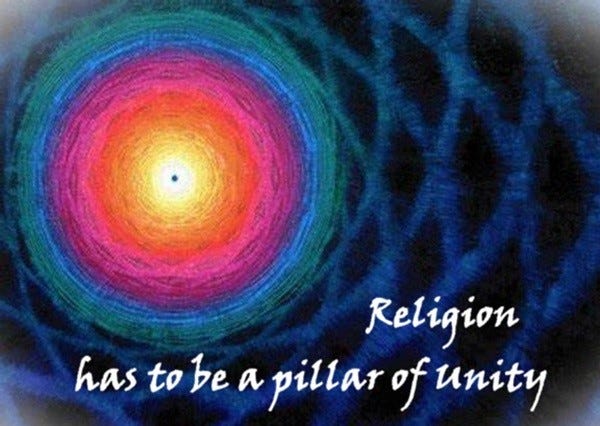In my last article ‘Three pillars for the World Union’, I put forward a possible ‘United Religions Organisation’ as the third pillar of a federal world union. The United Nations and my proposal for a ‘United Mankind Organisation’ were discussed several times in my articles. Now I would like to take a closer look at the possible role of ‘United Religions’ as the third of the supporting world organisations. I am writing these lines as a neutral agnostic, with no affiliation to any church or other religious organisation. I hope that my lay expertise is sufficient for this.
Just as UN member states' leading politicians and heads of state are responsible for the well-being of their country's citizens, they also bear a special responsibility for the future of humanity as a whole. This is precisely the ideal foundation of the United Nation. This is why the nations are united at the UN. Unfortunately, many national leaders have not yet realised this. Or they have completely different goals in mind that are actually incompatible with the basic idea of the United Nations. The UN still has a lot of work to do.
Analogous to the leaders of the state, the leaders of religious communities also bear responsibility towards their believers and the peoples among whom their religion is spread. Since the vast majority of religions are characterised by a belief in the divine creation in its entirety - whether produced by one god or by a multitude of gods - they also bear responsibility for the whole world and thus for humanity as a whole. It would therefore be of great benefit to all if they were to unite in a ‘United Religions Organisation’.
It is not about mixing religious beliefs, but about unbiased, tolerant and respectful unity and cooperation in diversity. It should also be possible to speak openly and honestly about serious differences. This is the only way to possibly bridge them. In most cases, they are based on misunderstandings and misinterpretations anyway. There are already interfaith organisations whose goals and projects could easily be integrated into a large ‘United Religions Organisation’.
United Religions - This intergovernmental organisation aims to provide a forum for the rapprochement of religions and cultural differences. I can fully subscribe to what you can read on their website.
United Religions Initiative (URI) - An international organisation with currently 1190 groups in 113 countries. There is a lot of power behind it.
Parliament of the World's Religions - This could become the General Assembly of a ‘United Religions Organisation’.
Religions for Peace - Currently considered the largest interfaith organisation in the world.
There are certainly more such organisations that could be listed here. Nor should we overlook those organisations that represent interreligious goals and can be assigned to a specific religion. For example, Pax Christi, Quaker Peace and Social Witness or the Bahá'í International Community, which itself represents the firm belief in the unity of mankind in its religion. The smaller religious communities, especially those of indigenous peoples, should not be neglected either. However, all of them - with the exception of the Bahá'ís - lack the future perspective of the political unification of humanity in a federal World Union.
How would it be if the aforementioned organisations were to meet for a ‘Summit of the World's Religions’ to found the ‘United Religions Organisation’? Drawing up a charter for this would probably not be a problem. This could also include a permanent ‘World Security Council of Religions’. At present, it would have a lot to do and perhaps be more successful than the United Nations Security Council. The members of the ‘United Religions’ would meet annually for their General Assembly, in Lhasa, Mecca, Rome and perhaps also once in Jerusalem. ‘I have a dream’, Martin Luther King once said.
A ‘United Religions Organisation’ could be strong and powerful and, together with a ‘United Mankind Organisation’, could have a positive influence on the political leaders in the United Nations states, so that the UN could finally be the world organisation we need.




